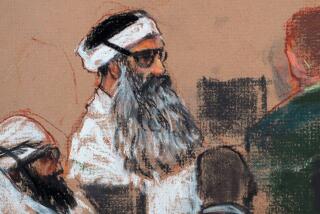Would-be LAX terrorist’s prison sentence overturned as too lenient
- Share via
A federal appeals court Tuesday overturned a 22-year prison sentence given to an Al Qaeda operative who plotted to detonate a bomb at Los Angeles International Airport, saying the punishment was too lenient.
A divided three-judge panel of the U.S. 9th Circuit Court of Appeals said the Seattle federal judge who sentenced Ahmed Ressam improperly deviated from sentencing guidelines.
Ressam had agreed to cooperate with the government on investigations into other suspected terrorists in exchange for a lighter sentence but ultimately reneged on the deal. U.S. District Judge John C. Coughenour gave Ressam a lenient sentence, the appeals court found. The panel cited four procedural errors by Coughenour and ordered the case transferred to another judge for sentencing.
Ressam, then 32 and traveling on a fraudulent Canadian passport, was detained in Port Angeles, Wash., on Dec. 14, 1999, as he attempted to smuggle powerful explosives hidden in the wheel well of a rental car into the United States on a ferry from Canada. He was convicted by a jury in 2001 on nine criminal counts for a plot to bomb LAX on the eve of the new millennium.
Coughenour had rejected the federal sentencing recommendation of 65 years in prison for the terrorism conspiracy offenses, noting that Ressam had provided U.S. intelligence with essential insights into the Al Qaeda network until he ceased cooperating with federal agents after solitary confinement and what he considered excessive interrogation.
Two years into his post-conviction agreement to cooperate in return for a reduced sentence, Ressam retracted statements key to prosecuting two other Al Qaeda suspects and undermining the conviction of a third.
The 9th Circuit panel cited Coughenour’s failure to adequately explain why he deviated from federal sentencing guidelines and his disregard of prosecutors’ concerns about potential security consequences if Ressam is released after 22 years at age 53.
“We conclude that the district court committed procedural error in failing to address specific, nonfrivolous arguments raised by the government in imposing a sentence that is well below the advisory sentencing guidelines range,” said the opinion written by Senior Circuit Judge Arthur L. Alarcon, appointed to the appeals court by President Carter. He was joined by Judge Richard R. Clifton, an appointee of President George W. Bush. Senior Judge Ferdinand F. Fernandez, appointed by the elder President Bush, dissented, saying that the “sentence was neither procedurally erroneous nor substantively unreasonable.”
Ressam’s original sentence in 2005 was vacated by a 9th Circuit panel when the appellate judges overturned his conviction on one of the nine counts. That ruling was appealed to the U.S. Supreme Court, which ordered resentencing in conformance with federal guidelines.
Prosecutors urged Coughenour to impose at least a 45-year sentence during a December 2008 proceeding, but the Seattle judge restored the 22-year term, citing Ressam’s assistance in providing “an unprecedented view of the inner workings [of Al Qaeda] that almost without question prevented . . . future attacks.” The judge also alluded to the nation preparing for “a new chapter,” as President Obama was about to be inaugurated.
Ressam’s revoked testimony against two alleged Al Qaeda operatives, Abu Doha and Samir Ait Mohamed, forced the government to abandon its prosecution of them. The men had been in British and Canadian custody at the request of U.S. officials, leaving the government “in a horrible position” with two important allies, First Assistant U.S. Atty. Mark Bartlett warned Coughenour at the resentencing 14 months ago.
Ressam, now 42, has remained incarcerated at the Supermax prison in Florence, Colo.
“We are gratified that the Court of Appeals recognized the importance of public safety at sentencing and that Mr. Ressam remains a threat to the public,” said Seattle U.S. Atty. Jenny A. Durkan.
A receptionist at the Seattle Federal Public Defender office said the attorney who argued Ressam’s case, Thomas W. Hillier, wasn’t taking media calls on the decision.
More to Read
Sign up for Essential California
The most important California stories and recommendations in your inbox every morning.
You may occasionally receive promotional content from the Los Angeles Times.










